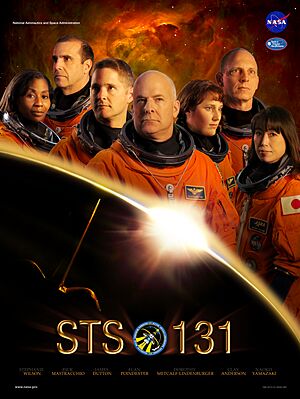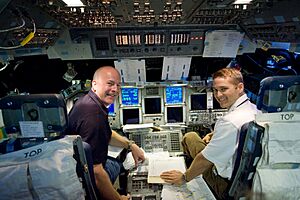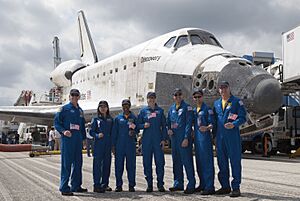Alan G. Poindexter facts for kids
Quick facts for kids
Alan Poindexter
|
|
|---|---|
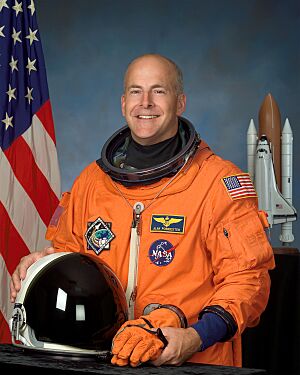 |
|
| Born |
Alan Goodwin Poindexter
November 5, 1961 Pasadena, California, U.S.
|
| Died | July 1, 2012 (aged 50) Pensacola Beach, Florida, U.S.
|
| Other names | Dex |
| Space career | |
| NASA astronaut | |
| Rank | Captain, USN |
|
Time in space
|
27d 21h 9m |
| Selection | NASA Group 17 (1998) |
| Missions | STS-122 STS-131 |
|
Mission insignia
|
|
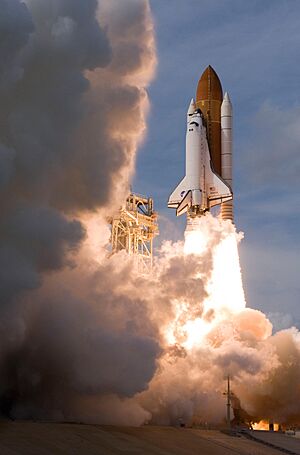
Alan Goodwin "Dex" Poindexter (born November 5, 1961 – died July 1, 2012) was an American officer in the U.S. Navy and a NASA astronaut. He was chosen by NASA in 1998 and flew into space on two Space Shuttle missions: STS-122 and STS-131.
Contents
About Alan Poindexter
Alan Poindexter was born in Pasadena, California. He grew up in Rockville, Maryland, which he thought of as his hometown. He was married to Lisa A. Pfeiffer and they had two children. Alan enjoyed many hobbies. These included riding motorcycles, running, and lifting weights. He also liked water skiing, boating, hunting, and fishing.
His Education Journey
Alan Poindexter finished high school in 1979 in Coronado, California. He then earned a degree in engineering from Pensacola Junior College in 1983. After that, he went to Georgia Institute of Technology. In 1986, he graduated with high honors. He earned a bachelor's degree in aerospace engineering. Later, in 1995, he received a Master of Science degree in aeronautical engineering. He earned this from the Naval Postgraduate School.
Alan Poindexter joined the United States Navy in 1986 after college. He became a Naval Aviator (a Navy pilot) in 1988. He learned to fly the F-14 Tomcat jet. He flew two missions to the Persian Gulf during his time as a pilot. One of these was for Operation Southern Watch.
In 1993, he was chosen to attend the U.S. Naval Test Pilot School. After graduating in 1995, he became a test pilot. He helped test new features for the F-14 jet. He was the main test pilot for a new flight control system. He was the first to land and launch an F-14 with these new controls from an aircraft carrier.
Poindexter flew for more than 4,000 hours in over 30 different types of aircraft. He also completed over 450 landings on aircraft carriers. After leaving NASA in 2010, he returned to the Navy. He worked at the Naval Postgraduate School.
His NASA Career
NASA chose Alan Poindexter to be an astronaut in June 1998. He started his training in August 1998. At first, he helped with Space Shuttle operations at Kennedy Space Center. In 2002, he was picked to be the pilot for the STS-120 mission. This mission was supposed to deliver a part to the International Space Station. However, the mission was canceled after the Space Shuttle Columbia disaster.
In 2006, Poindexter was assigned as pilot for the STS-122 mission. This mission delivered the European Space Agency's Columbus Laboratory to the International Space Station in February 2008. He also worked as a CAPCOM. This meant he was the main person talking to the astronauts in space from mission control. He was the commander of STS-131, which launched in April 2010. This mission carried important supplies to the space station.
When he retired from NASA in December 2010, Peggy Whitson, who was the Chief of the Astronaut Office, said kind words about him. She said he was a respected leader and they would miss him.
Space Shuttle Missions
- STS-122 (February 7–20, 2008) was a mission aboard Atlantis. It was the 24th Space Shuttle trip to the International Space Station. The main goal was to deliver and install the European Space Agency's Columbus Laboratory. Astronauts did three spacewalks to get the lab ready for science. They also replaced a tank on the station. This mission also swapped crew members on the station. The STS-122 mission lasted almost 13 days. It traveled over 5 million miles around Earth.
- STS-131 (April 5–20, 2010) was a supply mission to the International Space Station. It launched just before sunrise from Kennedy Space Center. The crew of Discovery did three spacewalks. They replaced an empty ammonia tank for the station's cooling system. They also moved over 13,000 pounds of supplies and equipment. This included a new sleeping area for the crew and three science experiment racks. On the way back, the shuttle carried over 6,000 pounds of old equipment and science samples. The STS-131 mission lasted over 15 days. It traveled more than 6 million miles in space.
His Passing
On July 1, 2012, Alan Poindexter died from injuries. These injuries happened during a water scooter accident. He was riding with his son when another water scooter, driven by his other son, hit him. He was taken to the hospital but sadly passed away. NASA shared a statement after his death. They said the NASA family was sad to hear about their former friend and colleague. They sent their thoughts to his family.
Organizations He Joined
- Society of Experimental Test Pilots
- Association of Space Explorers
Awards and Honors
Alan Poindexter received many awards and honors for his service. These include:
- Naval Aviator Badge
- Legion of Merit
- Defense Meritorious Service Medal
- Distinguished Flying Cross
- Navy and Marine Corps Commendation Medal
- Navy and Marine Corps Achievement Medal
- Navy Meritorious Unit Commendation
- Battle “E”
- NASA Space Flight Medal
- National Defense Service Medal
- Southwest Asia Service Medal
- Sea Service Deployment Ribbon
- Kuwait Liberation Medal (Kuwait)
- Marksmanship Medal for Rifle Expert
- Marksmanship Medal for Pistol Expert
- Naval Air Warfare Center, Aircraft Division Test Pilot of the Year 1996
- Top Ten Carrier Aviator, Carrier Air Wing Nine
- NASA Aviation Safety Award
In his honor, a Cygnus space capsule was named S.S. Alan Poindexter in July 2016. This capsule carried supplies to the International Space Station.
See Also
 In Spanish: Alan G. Poindexter para niños
In Spanish: Alan G. Poindexter para niños
Images for kids


